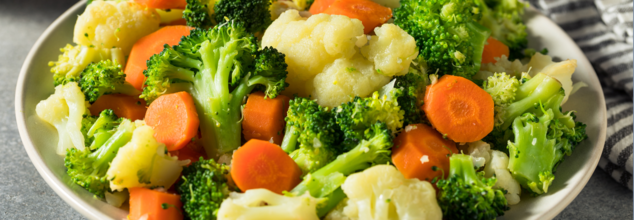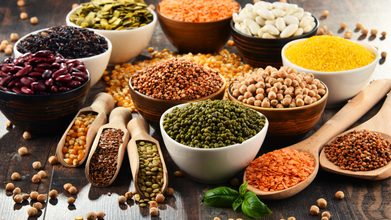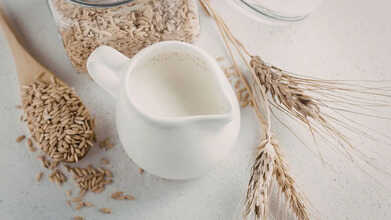- Health Conditions A-Z
- Health & Wellness
- Nutrition
- Fitness
- Health News
- Ayurveda
- Videos
- Medicine A-Z
- Parenting
Steaming vs. Boiling: Which Cooking Method Preserves The Most Nutrients?

Image Credit: Canva
Vegetables are certainly one of the healthiest foods rich in vitamins, minerals, fiber, and protective plant compounds, they play a big role in maintaining general health and preventing common diseases. However, when it comes to cooking vegetables, how you cook them can make a difference in their nutritional value.
Among the most common cooking methods are boiling and steaming, both of which affect vegetables in different ways. Although boiling immerses the vegetables in water, steaming uses hot vapor to cook the food. So, should you steam or boil vegetables for the best health benefits?
Vegetables have such essential nutrients that they present loads of health benefits to humanity. They are not just rich in vitamins but carry beta-carotene also, which acts like a shield against oxidative stress from any source and decreases the chances of severe diseases like heart disease, cancer, and diabetes. In addition, vegetables act like a great source of dietary fibers, which are imperative to digest food, maintain healthy blood sugar, and increase satiety for a long time.
However, as healthy as vegetables are, the way they are cooked plays a huge role in how well our body can absorb these nutrients. The cooking method you choose can either enhance or diminish the nutritional value of your vegetables.
Is Steaming A Healthier Choice?
Steaming is considered to be one of the healthiest methods for cooking vegetables. In this method, the vegetables are placed in a perforated basket above boiling or simmering water and allow steam to rise and cook the food gently. Since steaming doesn't require direct contact with water, there is a loss of fewer nutrients as compared to boiling.
One of the main benefits of steaming is that it does help retain water-soluble vitamins, vitamin C and B vitamins, which are commonly leached out when boiled vegetables soak in water. Research evidence has shown that steaming can have a higher concentration of retention of some vitamins, including vitamin C, beta-carotene, and flavonoid antioxidants, than boiling does. In fact, it was found in a 2009 study that steaming broccoli, one of the healthiest vegetables, would retain the most nutrients in comparison to five other ways of cooking, including boiling, microwaving, and stir-frying.
Steaming also maintains plant compounds like flavonoids, which are among the most potent antioxidants known for their association with several benefits, including cancer prevention. A study on different cooking methods showed that steaming enhanced the flavonoid antioxidants in most vegetables, including broccoli, spinach, and carrots. However, some vegetables, such as carrots, are increased in beta-carotene when steamed. Beta-carotene is a form of vitamin A that is crucial for eye health and immune function.
One of the interesting results of comparative research between steaming and boiling is that the vitamin C loss is less during steaming, especially as it is one of the sensitive vitamins to heat and water. It has been demonstrated that, in terms of loss, steaming vegetables have shown a very minor loss of vitamin C, only 14%, after five minutes of steaming. However, a loss of 54% was noted when boiling the vegetables.
Does Boiling Causes Loss of Nutrients?
Boiling the vegetables can save so much time, but boiling the vegetables does not guarantee their highest nutrient retention. Boiling simply puts the vegetables under hot water and cooks it under direct heat. However boiling can be said to be very swift since it will result in getting rid of nutrients found in water. To explain, many vegetables have massive portions of vitamins; for example, vitamin C can be dissolved by hot water during boiling. Most, therefore will leach away from the prepared meals.
Aside from Vitamin C, beta-carotene is one of the few major losers in boiled foods. Laboratory tests done on peas and cauliflower reveal that their more than 50 percent levels of antioxidants were destroyed. Boiling also causes huge losses of vitamins and minerals to vegetables such as spinach, broccoli, and Brussels sprouts. If you have to boil your vegetables, try to limit the time and avoid overcooking to minimize the loss of nutrients.
Interestingly, some vegetables, like carrots, may benefit from boiling, as boiling has been shown to increase the bioavailability of beta-carotene. However, this benefit is typically outweighed by the significant loss of other nutrients when boiled.
Can Microwaving Vegetables Be A Healthier Alternative?
If you’re looking for an alternative cooking method that preserves nutrients, microwaving could be a good option. Microwaving is the method of cooking food using electromagnetic waves and requires very less or no water. Thus, microwaving is a gentler method of cooking that helps retain water-soluble vitamins such as vitamin C. A study conducted in 2003 showed that vegetables such as zucchini, carrots, and beans, when cooked with little water in a microwave oven, had a significantly high amount of phytonutrients compared to those cooked by other methods, including boiling.
How to Cook Vegetables- Tips to Make The Choice
While steaming and microwaving are excellent ways for cooking vegetables, you can take it to the next level for maximizing the health benefits of your vegetables by using healthy fats in cooking. For instance, sautéing vegetables in extra-virgin olive oil can enhance the absorption of fat-soluble vitamins such as vitamin A, D, E, and K. Olive oil is also rich in antioxidants and polyphenols, which provide additional health benefits.
When cooking vegetables, do not overuse salt. Instead, season with fresh herbs, spices, and lemon juice. This will provide flavor without the negative health effects of too much sodium.
This argument in the war between steaming and boiling vegetables: it is simply a way to better retain the nutrients in food. This way of cooking helps in keeping vitamins and antioxidants from vitamin C, beta-carotene, and flavonoids that play an important role in human health.
The better it would be to steam the vegetables if you want to derive maximum health benefits from it. Steam or broccoli, spinach, carrots-any food cooked- is only allowed by steaming so that a maximum amount of nutrient value is retained. Further alternative, to microwaving, minimal water can be used too. No matter how one cooks his vegetables, add healthy fats like olive oil and season with herbs; in this way, nutrition of these vegetables will be maximized further.
Making small differences in how you prepare vegetables can make a big difference in your health. The next time you get ready to prepare a meal, steam it instead of boiling so that you have a much healthier, more nutrient-rich plate of vegetables.
Effects of different cooking methods on health-promoting compounds of broccoli. J Zhejiang Univ Sci B. 2009
Influence of cooking methods on antioxidant activity of vegetables. J Food Sci. 2009
Yes, You Can Eat More and Still Lose Weight, Here’s the Diet That Makes It Possible

Credits: iStock
Could there be a diet that allows you to eat more and still helps you lose weight? For the longest doctors and health experts praised the Mediterranean diet. This is because it is heart-friendly, and has a mix of fruits, whole grains, vegetables, and sea food. However, new research suggests that even a simpler diet would work better. As per British scientists, by simply cutting out ultra-processed foods, and sticking to unprocessed whole foods could lead to greater calorie reduction and weight loss.
Eating More, And Still Losing Weight? What Is Working
The key is to reduce the intake of calories, which is possible when you cut your ultra-processed foods. In a study, researchers found that people who followed a completely unprocessed diet consumed around 330 fewer calories per day than those who ate more processed food.
What surprised scientists was that participants actually ate more food by volume. Those on the whole-food diet consumed about 57 percent more food overall, yet still ended up eating fewer calories. The reason lies in the type of foods they chose, such as fruits, vegetables, salads, and lean proteins, which are naturally lower in calorie density.
This means people could eat larger portions, feel full, and still reduce their total energy intake.
Read: Ultra-Processed Foods May Add 330 Extra Calories A Day, Study Finds
Why Are Ultra-Processed Foods Problem?
Ultra-processed foods, often called UPFs, include items like ready meals, packaged snacks, sugary cereals, sweets, and hot dogs. These foods are typically high in calories, sugar, unhealthy fats, and additives, while being low in fiber and nutrients.
Ultra-processed foods, engineered with additives, preservatives, and artificial ingredients, now comprise over half the average American diet, based on data from the U.S. Department of Agriculture. Their ubiquity and intensive marketing have made them seem inevitable, but accumulating evidence indicates that the health toll is much more serious than realized.
Under the NOVA food classification system, UPFs are defined by their intensive industrial processing, which is typically used to produce hyper-palatable and highly profitable foods. Yet, the convenience comes with an increasingly large body of evidence showing that these foods contribute to a variety of chronic diseases, including cardiovascular disease, obesity, diabetes, depression, and various forms of cancer.
Researchers say UPFs may quietly push people towards overeating without realizing it. Even small portions can contain a large number of calories, making weight gain more likely over time.
The study suggests that when people are given the option to eat foods in their natural or minimally processed form, they tend to make smarter choices on their own.
Also Read: Are All Ultra-Processed Foods Bad For You? Experts Say Some Are Better Than Others
How Was The Study Conducted?
The research followed 20 overweight adults, including 10 men and 10 women, with an average age of 31. Participants were divided into two groups.
One group followed a two-week diet based on minimally processed foods such as vegetables, fruits, salads, and lean meats. The other group ate a diet rich in ultra-processed foods like hot dogs and ready meals. After two weeks, the groups switched diets.
Importantly, the meals were matched for nutrients such as fat, protein, carbohydrates, salt, and fiber. Despite this, those eating whole foods consumed fewer calories and lost nearly one kilogram in weight.
Feeling Fuller and Reducing Cravings

Researchers believe fruits and vegetables played a key role. These foods are high in water and fibre, which lowers their energy density. As a result, people can eat more without consuming too many calories.
Experts also point out that natural fiber helps people feel full for longer and supports gut health. Fibre can trigger hormones that regulate appetite, reducing cravings and helping with long-term weight control.
What This Means for Everyday Diets
The findings add to growing evidence linking ultra-processed foods to a range of health problems. Studies have previously associated high UPF intake with dozens of illnesses.
In the UK, ultra-processed foods make up about 57 percent of the average diet, one of the highest levels in Europe. Experts recommend that around 80 percent of daily food intake should come from whole or minimally processed foods.
The message from scientists is simple. You do not need complicated diet rules. Choosing foods closer to their natural form may help you eat better, feel fuller, and lose weight more sustainably.
Ultra-Processed Foods May Add 330 Extra Calories A Day, Study Finds

Credits: Canva
A small study suggests that people who avoid ultra-processed foods (UPFs) consume around 330 fewer calories each day on average—even while eating more by weight. Researchers say that when food is offered in its natural, unprocessed form, people tend to make “much smarter decisions.”
The study, conducted by the University of Bristol, reanalysed data from a U.S. clinical trial with 20 participants, which had found that eating only UPFs leads to overeating and weight gain. The team discovered that people eating solely whole foods naturally chose fruits and vegetables over higher-calorie items like pasta and creamy dishes.
Also Read: 11 Brain And Nerve Symptoms Neurologists Say Can Become Life-Threatening
Ultra Processed Foods: What Are They?
Ultra-processed foods are ready-to-eat products made in factories using industrial methods. They rely on chemically modified ingredients and additives rather than whole foods, and often contain little to no real nutrition. Instead, they are loaded with sugar, saturated fats, and salt, which can contribute to chronic health problems over time.
Ultra Processed Foods: How Whole Foods Change Eating Habits
According to the study, as per The Independent, people avoiding UPFs ate 57% more food by weight. Jeff Brunstrom, professor of experimental psychology at the University of Bristol, explained: “It’s exciting to see that when people are offered unprocessed options, they instinctively select foods that balance taste, nutrition, and satiety while still reducing overall calorie intake. Our dietary choices aren’t random—when food is in its natural state, people actually make smarter decisions than we expected.”
Ultra Processed Foods: Common Examples
According to NOVA, ultra-processed foods are ready-to-eat or ready-to-heat products made mostly from industrial ingredients and additives, rather than whole foods. Common examples include:
- Chips
- Carbonated drinks
- Instant noodles
- Ice cream
- Chocolate
- Biscuits
- Sauces and instant sauces
- Ready-made meals
- Mass-produced packaged bread
- Sausages and hot dogs
- Burgers
- Chicken and fish nuggets
- Instant soup
- Meal replacement shakes and powders
- Candy
- Pastries
- Fruit yoghurt
- Fruit drinks
- Cake mix
- Margarine
- Sweet or savory packaged snacks
- Energy bars
These foods are often high in sugar, salt, and unhealthy fats, and low in natural nutrients.
Ultra Processed Foods: Vitamin Fortification Can Mislead
The research also highlighted a concern: some UPFs meet micronutrient requirements through fortification. For example, pancakes and French toast sticks contained vitamin A. However, participants consuming only whole foods got their vitamin A from carrots and spinach, which are far lower in calories.
Ultra Processed Foods: The Calorie-Micronutrient Trade-Off
Dr. Annika Flynn, senior research associate at the University of Bristol, said: “This suggests that UPFs can deliver both calories and nutrients in a single product, which may lead to overconsumption. Whole foods, on the other hand, maintain a healthy balance, encouraging people to favour nutrient-dense options like fruits and vegetables instead of high-calorie foods such as pasta and meat.”
Ultra Processed Foods: Why This Matters for Everyday Eating
The findings underline how simple changes—choosing minimally processed, whole foods—can naturally reduce calorie intake without feeling restrictive. By letting people eat more volume while cutting energy intake, whole foods may help manage weight and improve overall nutrition.
Experts Say Oat Milk Might Not Be The Best Morning Choice; Here’s Why

Credits: Canva
Health specialists have cautioned that a widely used dairy milk alternative may come with downsides many people are unaware of, especially when consumed first thing in the morning, according to Mirror. Oat milk, a popular plant-based and dairy-free option, is often praised for its fibre content and for being fortified with calcium and vitamin D, both important for bone health. However, dietitians point out that compared to other plant-based milks such as almond milk, oat milk tends to contain higher amounts of carbohydrates, added sugars and oils.
What Is Oat Milk Made Out Of?
Oat milk is a dairy-free, plant-based drink that is commonly valued for its fibre content and added calcium and vitamin D, which support bone strength. That said, health experts note that it generally contains more carbohydrates, sugars and oils than many other plant milks, including almond milk.
Registered nutritionist Jenna Hope explains that oat milk is usually produced by creating a syrup from oats, which is then mixed with water. She adds that many well-known oat milk brands also include added oils, emulsifiers and stabilisers to improve texture and shelf life.
Why Is Oat Milk Bad For Your Health?
Experts say certain aspects of oat milk may negatively affect health, particularly when consumed on its own. Speaking to Parade, registered dietitian Melissa Rifkin said that while oat milk lattes can fit into a healthy diet, they are not nutritionally complete by themselves. She noted that although oat milk offers some fibre, most oat milk lattes are low in protein and fat, two nutrients that help regulate blood sugar levels and promote fullness.
Sharing a similar view, registered dietitian Nour Zibdeh told The Independent that oat milk’s high carbohydrate content can lead to sharp rises in blood sugar when consumed in the morning. This effect is less pronounced with dairy milk, which naturally contains protein and fat that help balance its sugar content.
Ms Zibdeh also told Parade that oat milk is low in protein and fat, which contributes to greater blood sugar spikes. French biochemist and author Jessie Inchauspé, widely known as the “Glucose Goddess”, has also criticised oat milk. In a 2024 interview with American entrepreneur Marie Forleo, she described oat milk as similar to drinking “starch juice”, explaining that oats are a grain and grains are primarily made up of starch.
Should You Replace Oat Milk With Cow Milk?
Overall, nutrition experts tend to agree that cow’s milk offers greater nutritional value. Regular dairy milk intake has been linked to better metabolic and heart health, and cow’s milk contains higher levels of key micronutrients such as phosphorus, which supports healthy bones and teeth, along with calcium, vitamin D, B vitamins and potassium, compared to oat milk.
That said, cow’s milk is not suitable for everyone. Allergies, taste preferences and vegan diets mean many people rely on plant-based alternatives. If oat milk is your preference, there is no need to panic. Experts stress that moderation is key and that oat milk can still be enjoyed as part of a balanced diet.
Choosing oat milk does not mean it needs to be completely removed from your routine. There are simple ways to enjoy it while being mindful of expert advice. For those who love an oat milk latte, pairing it with protein-rich foods such as eggs or Greek yoghurt can help balance blood sugar levels and make the meal more satisfying.
© 2024 Bennett, Coleman & Company Limited

